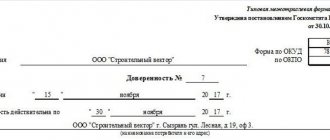Bookmarked: 0
A power of attorney is an official document designed to enable the principal to instruct a trusted representative to perform legal actions on his behalf before third parties. A fairly common document is a power of attorney for registration of an apartment. It is resorted to in cases where it is difficult for a person to personally collect documents or carry out legal manipulations with real estate. By signing a power of attorney for registration of an apartment, the principal will be able to register the housing, even while outside the region.
General information
There are several types of power of attorney for registration of real estate. For example, in order to collect the necessary documents for housing in government agencies, a one-time power of attorney is sufficient. To perform several actions, a special form is suitable. As a rule, it is issued for the period necessary to perform only these acts and ends immediately after their completion.
However, the most often used is a general form of power of attorney for registration of an apartment. According to it, the trustee can perform most of the legal actions with real estate specified in the document. If it is necessary on behalf of the owner to sell, buy a premises, register an inheritance for it or enter into a mortgage agreement, a power of attorney for registration of an apartment is a mandatory requirement.
When is a power of attorney required to register property rights?
The right to real estate (as well as the transfer of this right on various grounds) is subject to registration in the state register (USRN).
Such objects include land plots and capital construction projects that are firmly connected to the land: for example, houses, apartments, garages. In this case, you can contact the relevant authorities either independently or by proxy. According to the legislation of the Russian Federation, if a representative applies by proxy with an application for state registration of ownership or transfer of ownership, as well as for the implementation of state cadastral registration, it is necessary:
- submit the original and a copy of the power of attorney (it should be borne in mind that the original is returned to the applicant after completion of registration and registration actions);
- a power of attorney for the presentation of documents, as well as for their receipt, must be notarized, unless otherwise established by federal law of the Russian Federation.
You should also know that if the right of ownership arises on the basis of a notarized transaction, then state registration of the right can be carried out at the request of a notary. In this case, the notary acts on his own behalf in the interests of persons on whose behalf and on whose behalf this or that notarial act was performed. The powers of a notary associated with applying to the rights registration authority are exercised without a power of attorney
How to compose correctly
There is a specific template for a power of attorney for registration of an apartment. It was compiled on the basis of Articles 185 and 186 of the Civil Code of our state. These paragraphs regulate the conditions for issuing the document and the terms for which it is issued. The requirements for authorized persons and methods for certifying a power of attorney are also indicated. Important! Currently, if the power of attorney does not indicate the end of its validity, it will be considered valid for a year from the date of issue. Before 2013, this period was three years.
To sign a power of attorney to register your home, you need to collect the following basic package of documents:
- principal's passport;
- passport of the authorized person;
- document substantiating the right to own the apartment (deed of gift, Certificate of Inheritance or purchase and sale agreement)
- cadastral passport of the premises.
It makes sense to download the power of attorney for registration of an apartment in advance and familiarize yourself with its contents even before signing the document, so as not to miss important points. If the example of a power of attorney for registration of an apartment is correctly drawn up, then by the time the power of attorney is signed there will be no questions left.
1.4. Rules for issuing a power of attorney
A power of attorney is drawn up in writing and in some cases requires mandatory certification by a notary. Thus, the following are subject to notarization:
· powers of attorney for transactions requiring notarial form;
· powers of attorney to submit applications for state registration of rights or transactions;
· powers of attorney to dispose of rights registered in state registers;
· powers of attorney issued by substitution ;
· irrevocable powers of attorney;
· cancellation of notarized powers of attorney.
In addition, the law equates to notarized powers of attorney :
1) powers of attorney of military personnel and other persons undergoing treatment in hospitals, sanatoriums and other military medical institutions, which are certified by the head of such an institution, his deputy for medical affairs, and in their absence, the senior or duty doctor;
2) powers of attorney of military personnel, and at points of deployment of military units, formations, institutions and military educational institutions, where there are no notary offices and other bodies performing notarial acts, also powers of attorney of employees, members of their families and family members of military personnel, which are certified by the commander (chief ) these units, formations, institutions or establishments;
3) powers of attorney of persons in places of deprivation of liberty, which are certified by the head of the corresponding place of deprivation of liberty;
4) powers of attorney of adult capable citizens living in stationary social service organizations, which are certified by the administration of this organization or the head (his deputy) of the relevant social protection body.
A power of attorney to receive wages and other payments related to labor relations, to receive remuneration for authors and inventors, pensions, benefits and scholarships, or to receive correspondence, with the exception of valuable correspondence, can be certified by the organization in which the principal works or studies, and by the administration inpatient medical institution where he is being treated. Such a power of attorney is certified free of charge.
Before performing a notarial act to certify a power of attorney, a notary in accordance with Art. 16 Fundamentals of the legislation of the Russian Federation on notaries explains to the applicant for a power of attorney the legal consequences of issuing a power of attorney in order to avoid any abuses and violations of the rights and legally protected interests of each party.
Before performing a notarial act, the notary establishes the identity of the person applying, checks the legal capacity of the citizen and the legal capacity of the legal entity, the powers of the representative of the legal entity in accordance with the constituent documents.
The identity of Russian citizens is established by a passport or other identity document that replaces a passport. The identity of Russian citizens permanently residing abroad and arriving in the Russian Federation for temporary residence is established using their general foreign passports. The identity of foreign citizens living on the territory of the Russian Federation is established by passport, as well as by another document established by federal law or recognized by an international treaty.
The legal capacity of a legal entity arises from the moment information about its creation is entered into the unified state register of legal entities and terminates when information about its termination is entered into the said register. A power of attorney on behalf of a legal entity is issued signed by its head or another person authorized to do so in accordance with the law and constituent documents.
When certifying a power of attorney, the notary explains to the represented the right to provide in the power of attorney the possibility of sub-assignment by the representative of the powers transferred to him under this power of attorney, as well as subsequent sub-assignment. In addition, the notary explains to the represented his right to cancel the power of attorney and the procedure for its cancellation.
The notary enters information about notarized powers of attorney (in particular about the person who certified the power of attorney, the date of certification of the power of attorney, its registration number in the register of notarial acts, the date and time of entering information about the cancellation of the power of attorney in the event that the power of attorney is cancelled) into the Unified Notary Information System . This information forms a public register of powers of attorney , to which free and direct access is provided to an unlimited number of persons without charging a fee using the Internet information and telecommunications network every day and around the clock.
Thanks to this online service, citizens can obtain reliable legal information about all powers of attorney executed and revoked by a notary. written authority granted by one person to another person to complete a transaction with a third party; a person on whose behalf a power of attorney is made; an official authorized by the state who has the right to perform notarial acts on behalf of the Russian Federation in the interests of Russian citizens and organizations (legal entities); the ability of a citizen to own through actions, acquire and exercise civil rights, create civil responsibilities for oneself and fulfill them. The capacity and legal capacity of a citizen are mandatory for his participation in civil legal relations. Legal capacity arises in full upon reaching the age of majority – 18 years. Until a person reaches the age of eighteen, legal capacity is acquired through marriage and emancipation. the ability of a person, enshrined in law, to have legal rights and bear legal responsibilities, which is recognized equally for all citizens. The legal capacity of a citizen arises at the moment of his birth and ends with death.
Power of attorney form for registration of an apartment
The special power of attorney form for registration of an apartment includes the following mandatory information:
- the subject of the Russian Federation in whose territory the document is drawn up;
- date of compilation (to avoid discrepancies, it is better to write it down not in numbers, but in words);
- details of the apartment owner (full name, passport details, place of registration);
- details of the authorized representative;
- a detailed list of the representative’s powers (it is best to specifically list what actions, instead of the principal himself, can be performed by a person authorized by him);
- notary information;
- entry number in the Register;
- the amount of payment for notary services.
It is worth noting that the power of attorney is drawn up on a special form, which is available from the notary, and a one-time power of attorney can be signed independently by the principal and his representative. To do this, all you need is a power of attorney to register an apartment and fill it out in compliance with all the rules. It would be a good idea to enlist witnesses when drawing up this document.
Approximate contents of a power of attorney for the sale, rental and other actions with the apartment
Now let's look at the approximate structure of a notarized power of attorney and its content.
- At the very top, the name of the document (“Power of Attorney”), the place of its issue and the date are indicated. By the way, the date of issue of the power of attorney is a prerequisite for its validity.
- This is followed by the surname, name and patronymic of the principal, indication of citizenship, date and place of birth, his full passport data, information about the authority that issued the document, and address of residence. This is followed by information about your real estate. For example, the address of the location of the apartment, its area, number and date of issue of the certificate of ownership, the basis for acquiring the right.
- Similar information about the trustee is provided below. It is important to say that one power of attorney may indicate several representatives. In this case, everyone can be granted both an individual scope of rights and all the rights specified in the power of attorney.
- The following is information about the order that you trust to be carried out on your behalf. In our case, this means carrying out any transactions with the specified real estate, including alienation by any method not prohibited by law and rental. To do this, the representative is delegated the authority to submit and receive any documents, including certificates, extracts, statements, explanations, and sign all documents necessary for the proper execution of the specified order. As well as representing your interests in all state and non-state bodies or before individuals on issues related to the assignment.
- The following are indicated: the validity period of the power of attorney, an indication of the possibility of reassignment (or the lack of such a possibility), and you confirm that the consequences of issuing the power of attorney and the provisions of the law on powers of attorney have been explained to you. Then the personal signature of the person who issued the power of attorney is affixed.
- After all of the above, the notary’s details are indicated and his personal signature is affixed. With his signature, the notary confirms that the power of attorney was made in his presence, he verified your identity and legal capacity. The number of the power of attorney in the register and information about the amount collected for services are also indicated.
What to pay attention to
Any manipulations with real estate are very important, so responsibility must be shown when choosing a trustee, when choosing a notary, and when filling out a document on the right of trust. No errors in the power of attorney are acceptable. You should also remember that a power of attorney without a date, signature and seal of a notary is invalid. Typically, the power of attorney scheme for registration of an apartment is quite universal. The document may differ depending on the subject of the Russian Federation in which it is registered.
Power of attorney to submit reports to the Federal Tax Service
A person who represents the interests of the company has the right to submit declarations to the Federal Tax Service for the taxpayer on the basis of Art. 29 of the Tax Code of the Russian Federation. An authorized representative can be an individual, an organization or an individual entrepreneur. In all cases, you will need to submit a power of attorney to submit reports to the tax office. Some types of such documents are certified by a notary or a person authorized to do so.
Below are samples of powers of attorney and the procedure for filling them out for each authorized representative of the company.
Power of attorney for organization
If the submission of reports to the tax authority is carried out by a third-party organization, then the power of attorney of the authorized representative is signed by the head of the company or his deputy. There is no need to stamp or notarize such a document.
It indicates an authorized person of a third-party company who has the right to sign.
Sample power of attorney for an organization
Power of attorney for an authorized employee
Such a power of attorney is issued in the case when the chief or staff accountant submits reports to the Federal Tax Service. The document contains information on behalf of the head of the enterprise about vesting the relevant powers in the responsible employee.
Sample power of attorney for an authorized employee
Power of attorney for individual entrepreneurs
When the tax reporting of an individual entrepreneur is submitted to the Federal Tax Service by another individual entrepreneur, the power of attorney is certified by a notary.
Sample power of attorney for individual entrepreneurs
Electronic power of attorney
The tax report and the power of attorney for its provision are issued in digital form. This method does not require notarization. A copy of the document confirming the authority of the representative is attached to the declaration. The duplicate is signed by the principal's UKEP and sent via TKS.
The draft electronic power of attorney format is posted on the Federal portal of legal acts. The regulatory legal act was developed by the Federal Tax Service and at the time of publication is at the analysis stage. The tax service will soon provide a sample of this document.
The revised unified requirements for electronic power of attorney are also posted on the regulatory legal acts portal. According to the project, the document is drawn up as follows:
- in XML format;
- sign the UKEP in the XMLDSIG format or in the format approved by order of the Ministry of Digital Development dated September 14, 2020 No. 472;
- in pdf format, if the information system does not implement the possibility of automated processing and visualization of document data;
- confirm the principal's UKEP.
Resource “Power of Attorney” in the Federal Tax Service
In order not to provide a power of attorney to submit reports to the tax office with each report, the Federal Tax Service has developed a special data storage system. The information resource “Power of Attorney” is an electronic database of documents that stores information about representatives authorized to provide declarations.
A power of attorney is drawn up and submitted to the tax office. The document is created on paper or in the form of an electronic file, signed by the principal’s UKEP. The text indicates the mandatory details approved by Appendix 2 of the Federal Tax Service order No. ММВ-7-6/200 dated 04/23/2010.
The department employee enters the power of attorney into the database. The submitted information is stored by the tax office for three years. After this, the authorized employee, together with the tax reporting, sends an information message indicating the previously submitted details of the power of attorney.
A submitted power of attorney can be revoked. The application is made in any form. The communication of the revocation is carried out in the same ways as the submission of a document granting authority.
If an organization changes its name or director, then the power of attorney does not need to be revoked.
What risks exist in transactions with a power of attorney and how to avoid them.
Let's consider what risks associated with the right to sell property may arise. Risks are relevant for both parties.
For the buyer of an apartment.
The main thing that the buyer needs to check is the identity and capacity of the seller. The presence of a representative from the second party automatically implies the absence of the principal himself. Another important verification factor arises: to make sure that the power of attorney was not obtained fraudulently or deceptively in relation to the owner.
What should you pay attention to to ensure that the power of attorney has been entered into in compliance with all legal standards?
- Notarization. The notary's stamp must be affixed, where his personal data can be seen. You can find information about the notary who issued the document on the FNP resource: Federal Notary Chamber.
- Verification of documents. You must ask the representative for a passport. Information about the principal must be similar to the USRN extract and the Title to the apartment.
- Deadlines. It must remain valid at the time the transaction is concluded.
- Checking additional data. Check the registers to see if it has been revoked and if the principal has died at the time of the transaction. Otherwise, the purchase and sale agreement will be considered void.
- Terms of reference. Make sure that the document allows you to conduct purchase and sale transactions.
- Competency check. If the seller is incapacitated, the transaction will then be declared invalid in court.
Special caution should be exercised if:
- the seller is an elderly person;
- the seller lives and is registered alone.
It is precisely such people who become easy victims of scammers. The problem is that after the transaction, the deceived seller will easily challenge it if the court recognizes the presence of threats or misconception at the time of granting the power of attorney.
For the real estate seller.
The seller has fewer risks. But still, to avoid problems, it is better to record all actions with a notary. The seller must check:
- the identity of the buyer's authorized representative;
- buyer’s identity, passport details;
- limitation of legal capacity or general legal capacity of the buyer;
- validity period of the presented paper;
- terms of reference.
Registration of a power of attorney from a notary for the purchase of an apartment is carried out with a printed certification. The seller will need to make sure that the notary is still working, that his legal address matches the actual one, and that the seal is valid. Otherwise, there may be consequences in the form of declaring the transaction void or invalid, returning the apartment and demanding money.









